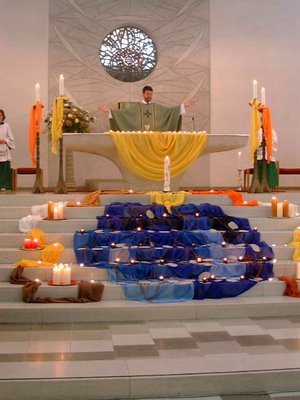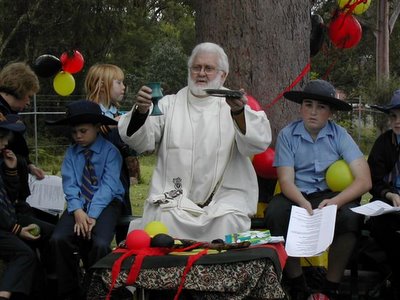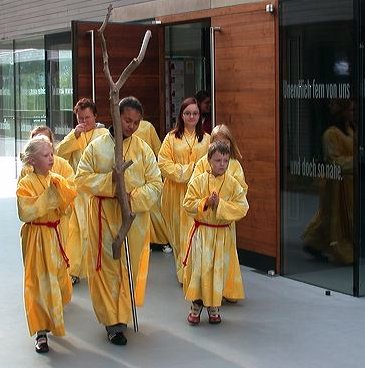One of the last documents on the Divine Liturgy issued by the late Pope John Paul of happy memory is the Instruction from the Congregation for Divine Worship and the Discipline of the Sacraments . The document Redemptionis Sacramentum" subtited, "On certain matters to be observed or to be avoided regarding the Most Holy Eucharist" vindicates the right of the laity to complain about liturgical abuses.
Redemptionis Sacramentum states that any Catholic has the right to lodge a complaint to the diocesan Bishop or to the Apostolic See on account of the primacy of the Roman Pontiff. However it is fitting that the report or complaint should go first to the diocesan Bishop and it is to be made in truth and charity.
The Instruction is a sequel to the Holy Father's Encyclical letter Ecclesia de Eucharistia, and is to be read in continuity with the letter. It is not primarily about regulations and rubrics, as critics might claim, but about the Eucharist, central to Catholic life and faith, hence protected by official practices and laws that affirm the Church's teaching on the Eucharist.
Signed by Cardinal Francis Arinze, Prefect of the Congregation, the document has been mandated by Pope John Paul II. It was prepared in consultation with the Congregation for the Doctrine of the Faith at the time headed by Joseph Cardinal Ratzinger, now Pope Benedict XVI. Liturgical abuses often compromise Catholic faith in the Real Presence and the Sacrifice of the Mass, doctrines reaffirmed in the introductory sections. Sadly, most of the people in the pew do not even know it.
The document includes a useful collection of current regulations and norms.
* Making eucharistic bread with additives (such as fruit, sugar or honey) is forbidden.
* The Eucharistic Prayer is to be recited by the priest alone; he may not change the words nor use an unauthorised Eucharistic Prayer.
* He must always wear a chasuble over his alb and stole.
* Eucharistic vessels are to be made of metal, not glass, earthenware, clay or other breakable materials.
* Pouring the Blood of Christ from one vessel to another is completely to be avoided, and flagons, bowls or other vessels are not to be used in place of chalices.
The rights of the faithful, and reverence during Holy Communion, are emphasised:
* Communicants are free to choose whether to receive on the tongue or in the hand, but if they receive in the hand they must consume the Host in the presence of the minister of Communion.
* People cannot be denied Communion because they choose to kneel or stand.--(Remember Antigonish, Nova Scotia?)
* The priest must receive Communion before the faithful receive Communion.
* The practice of "self-intinction" (communicants dipping the Host in the chalice) is forbidden.
* The Communion plate should be retained so as to avoid the danger of the sacred Host or some fragment of it falling.
* The vessels are to be cleansed at the altar or credence table after Communion or after Mass (i.e., they are not taken to the sacristy to be cleansed).
The Instruction also repeats the rule that children are to make their first Confession before first Communion.
Other norms govern how and when Mass is celebrated.
* Non-biblical texts are not to be used as Mass readings.
* Special Masses for groups are permitted but these groups are not exempt from liturgical norms.
* Cancelling Masses on the pretext of a "fast from the Eucharist" is an abuse to be reprobated.
* Priests are earnestly requested to celebrate daily Mass for their people.
* Except when the ecclesiastical authorities schedule Mass in the language of the people, priests are always and everywhere permitted to celebrate Mass in Latin.
Emphasis is also placed on distinctive ministries in the celebration of the Liturgy, and the need to avoid diminishing the essential role of the priest:
* Lay people, even religious, seminarians and pastoral assistants, are not to read the Gospel or preach the homily at Mass. (The Bishop may allow lay preaching outside Mass in unusual circumstances.)
* The expression "Special Minister of the Eucharist" is to be replaced by Extraordinary Minister of Holy Communion.
* Extraordinary Ministers are only to be used when needed, not for the sake of "fuller participation of the laity" in the Liturgy.
* Male altar servers remain the norm and are a source of priestly vocations, but the diocesan Bishop may permit female servers.
Tabernacle
The worthy reservation and adoration of the Blessed Sacrament is promoted:
* The tabernacle is to be in a part of the church that is prominent, readily visible, adorned in a dignified manner and located so that people may pray in front of it.
* Public communal adoration, exposition and personal visits to the Blessed Sacrament are encouraged, and churches where the Eucharist is reserved should be open at least for some hours each day.
* It is highly recommended, especially in cities and large towns, that the diocesan Bishop should designate a church for perpetual adoration.
* He should acknowledge and foster associations of the faithful for carrying out adoration.
The final section of the Instruction on "Remedies" includes penalties for those who profane the Eucharist or disobey liturgical laws. However:
* It is the Bishop's responsibility to regulate the liturgy and, within the limits of his competence, to issue norms on liturgical matters by which all are bound.
* In difficult cases the Congregation for Divine Worship will assist him.
It remains to be seen to what extent the norms and provisions of Redemptionis Sacramentum will be enforced. But the laity now know that they can appeal to Rome. This is why the Instruction should be circulated everywhere so that Catholics can enjoy the right to the Liturgy of the Church - and the right to be informed.
 Perhaps some of you have heard about the goings on in Orange County California. This is the diocese of the infamous Bishop Todd Brown. Bishop Brown is the Bishop banned kneeling at one church and refused to give the Eucharist to a woman who kneet at another. Yet, he tolerates or even appreciates the antics of Father Fred Bailey which took place on Saturday, October 28, 2006. Yes, this is the good father dressed up like Barney!
Perhaps some of you have heard about the goings on in Orange County California. This is the diocese of the infamous Bishop Todd Brown. Bishop Brown is the Bishop banned kneeling at one church and refused to give the Eucharist to a woman who kneet at another. Yet, he tolerates or even appreciates the antics of Father Fred Bailey which took place on Saturday, October 28, 2006. Yes, this is the good father dressed up like Barney! George W. Bush's dog
George W. Bush's dog

 Well, at least he's dressed for Advent!
Well, at least he's dressed for Advent!
















